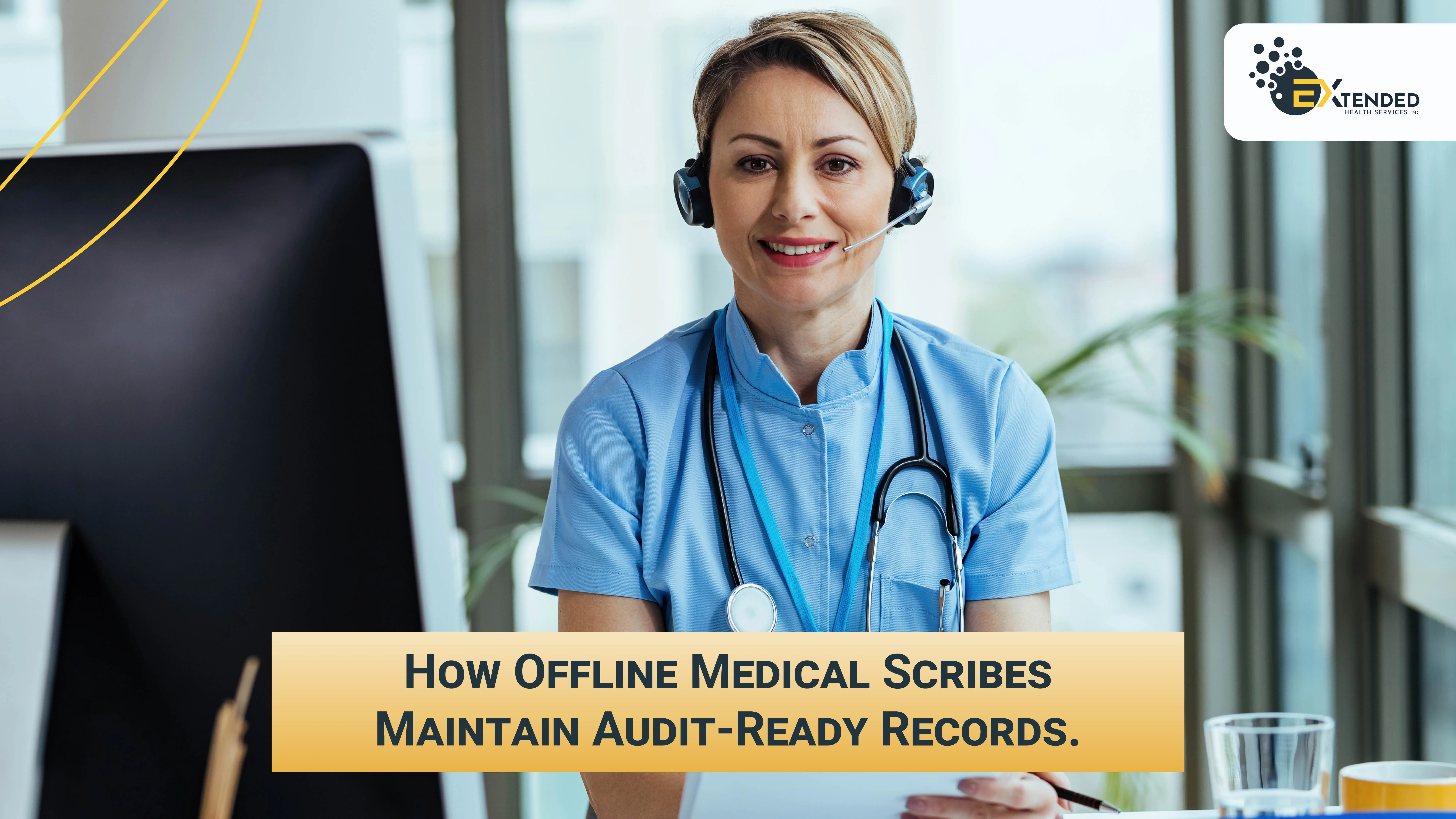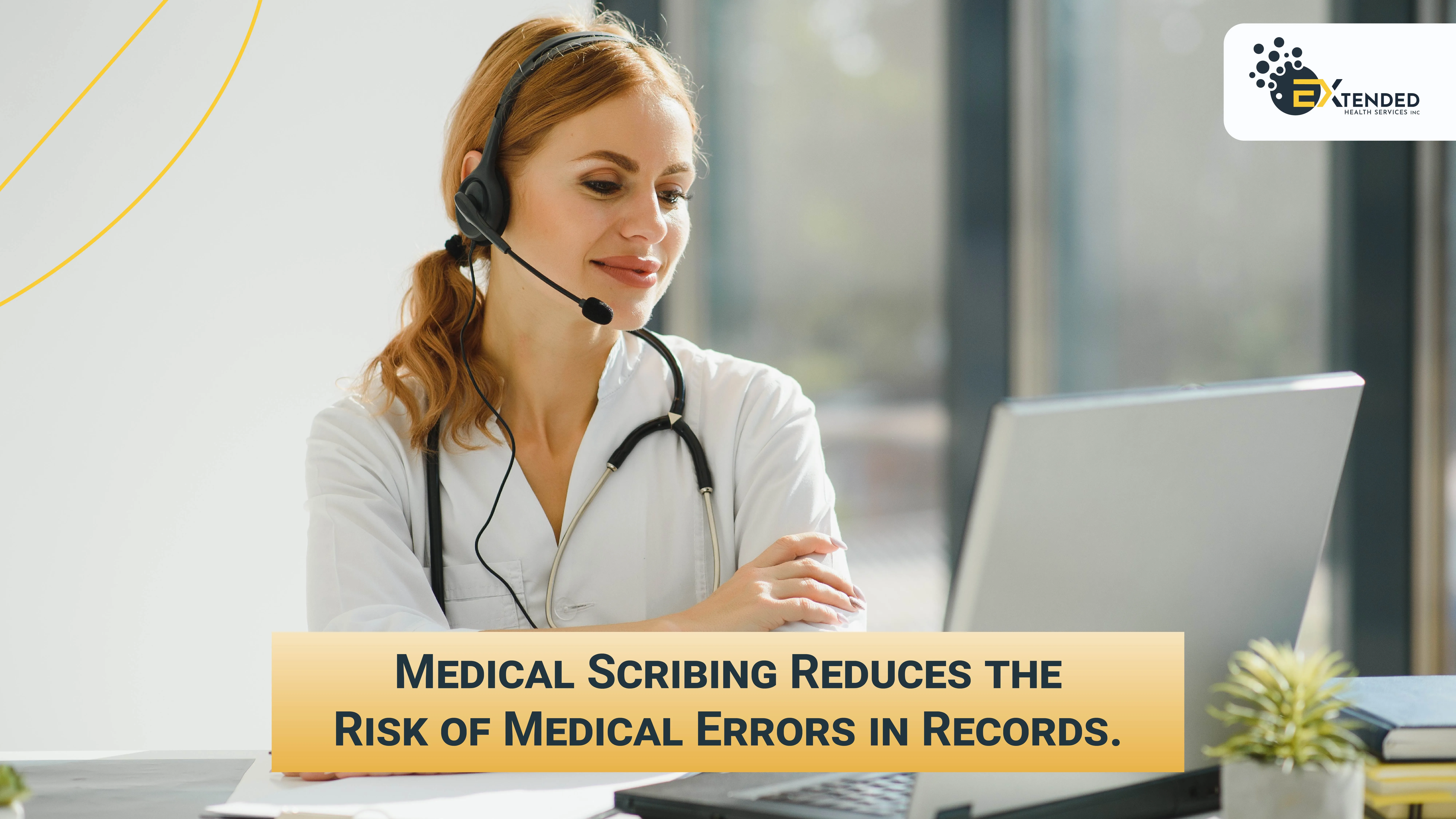How Offline Medical Scribes Maintain Audit-Ready Records


July 23, 2025
Healthcare runs on details. Document every symptom, medication, diagnosis, and follow-up instruction clearly and accurately.
That’s where offline medical scribes come in. They help keep healthcare records complete, accurate, and compliant. They do this without slowing down providers.
Technology has made clinical documentation easier, but it still needs human oversight. Offline scribes connect care delivery with documentation.
They make sure records are ready for daily care, audits, legal reviews, and insurance claims.
What Does an Offline Medical Scribe Do?
An offline medical scribe works alongside physicians in clinics, hospitals, or private practices. They're not on Zoom or behind a screen at home. They’re right there, in the room or just outside.
Their job is to document the visit in real time while the physician focuses on the patient. This means putting data into the electronic health record (EHR). You’ll also organize it and make sure to include all billing and compliance details.
Their presence means nothing gets missed or forgotten after the fact. When you're trying to recall details at the end of a long day, it's easy to overlook something important. Scribes prevent that.
Accuracy That Supports the Entire Care Process
When medical notes are incomplete or vague, it can affect every part of care. Accurate records are crucial for many things. They help with prescriptions, specialist referrals, billing, and follow-up plans.
Offline scribes catch small errors that might go unnoticed. These include undocumented allergies and missed medication changes.
Scribes learn to spot what’s important in clinical notes. They also understand medical terms and workflows well. That makes them more than just note-takers.
They are support pros who keep healthcare documentation accurate every day.
Tools That Make the Work Easier
Offline scribes don't make clinical decisions, but they need the right tools to work well. Most people learn to use various scribe tools.
These include templates, structured fields in EHR systems, and speech recognition software. These tools help speed up data entry.
This consistency is very important when different providers care for the same patient. It also helps when a record is reviewed during a healthcare audit.
What About Document Security?
When patient records are involved, privacy matters. Offline scribes work right in the healthcare facility.
This means they face fewer data security risks than remote scribes. They aren’t logging in from home or transferring notes over unsecured networks.
Their work stays within the walls of the clinic, under the same security protocols as the rest of the care team.
Document security isn't just about keeping records safe. It also means storing them correctly, updating them on time, and limiting access to those who need it.
Offline scribes learn HIPAA rules. They know how to manage sensitive patient information safely.
Staying Compliant with Legal and Clinical Standards
There’s a legal side to documentation that can’t be ignored.
Providers must ensure their records can handle scrutiny for:
• Insurance reimbursement
• Malpractice defense
• Government oversight
Offline scribes are trained to meet legal standards. They ensure every entry has all the required details.
This could mean noting when a patient says no to treatment. It also means getting consent for procedures.
Plus, the treatment plan must be written down. It’s easy to miss this in a busy practice. That’s why a trained scribe is there to catch it.
How Scribe Training Makes a Difference
The right documentation starts with good scribe training. It takes more than just typing skills to become a reliable scribe.
Most programs include lessons in anatomy, physiology, common medications, and clinical workflows.
Scribes also learn how to use EHRs, navigate patient records, and understand the structure of a proper clinical note.
Ongoing training is just as important. As guidelines and technology change, scribes need to keep learning to stay effective.
The best scribes are the ones who adapt easily, ask questions when needed, and understand the context of what they’re documenting.
Getting Through an Audit Without Stress
No one looks forward to a healthcare audit, but they’re a reality in nearly every healthcare setting. Payers, regulators, and internal reviewers depend on documentation.
It helps confirm that care was appropriate, timely, and legally sound. Poor documentation can lead to payment delays, penalties, or worse.
When records are clean, clear, and properly maintained, audits are a lot less stressful. One big long-term benefit of having an offline scribe is that your documentation is always audit-ready. It stays prepared, not just during reviews, but all the time.
Real Support for Real Workflows
Offline scribes give providers something that’s often in short supply of time. Time to focus on patients, not paperwork.
Time to think through care plans without worrying about typing them up later. And time at the end of the day to go home, instead of catching up on charting.
That kind of support changes the feel of the entire clinic. Providers are less burned out, patients get more attention, and records are more complete. Everyone benefits.
Final Thoughts
Accurate, secure, and consistent documentation is essential in every healthcare setting. Offline scribes help by supporting providers. They reduce errors and ensure records are ready for audits or legal reviews.
At Extended Health Services, our skilled offline scribes ensure your practice is accurate, secure, and ready for audits. Join us to enhance your documentation. This way, you can focus more on what truly matters, your patients.
Frequently Asked Questions (FAQs)
Q: What makes offline medical scribes different from remote scribes?
Offline scribes work on-site and document patient encounters in real time. This enables direct talks with providers. You can clarify medical details right away. Plus, it improves document security because everything is handled within the clinic's network.
Q: Can a scribe help with legal compliance?
Yes. A trained scribe knows what to document for each patient visit. This helps meet legal compliance standards. This includes consent, treatment details, and clear progress notes. These are key for defending care decisions during audits or legal challenges.
Q: How does a scribe improve record accuracy?
Scribes reduce the chance of missed details by documenting as the encounter happens. Their presence improves record accuracy and enhances medical charting. This leads to better care quality and improved operational efficiency.
Q: Are scribes trained in using EHRs and documentation tools?
Through thorough scribe training, they learn to use EHR platforms, templates, and other tools. This helps them enter data quickly and accurately.
Q: Do scribes help with audit preparation?
Yes. Their documentation helps with compliance, billing, and reporting. This makes it easier to review your records during a healthcare audit. That means fewer corrections and a smoother review process.
Recent Blogs

Why Every Business Needs a Robust Digital Marketing Plan
Posted by: Admin | July 23, 2025

Medical Scribing Reduces the Risk of Medical Errors in Records
Posted by: Admin | July 23, 2025

Marketing with AI: Decoding Customer Intent through Digital Intelligence
Posted by: Admin | July 23, 2025

How Offline Medical Scribes Maintain Audit-Ready Records
Posted by: Admin | July 23, 2025
Trusted by Healthcare Providers Nationwide
Empowering You for Financial Success
© Copyright 2025, All Rights Reserved